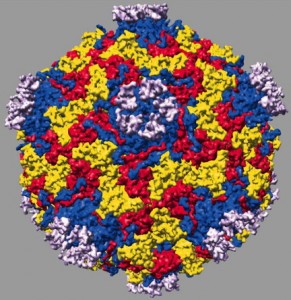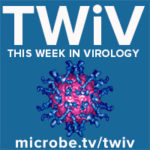 Hosts: Vincent Racaniello and Dick Despommier
Hosts: Vincent Racaniello and Dick Despommier
Vincent and Dick continue virology 101 with a discussion of virus entry into cells, then answer reader email on colony collapse disorder and viruses that confer a benefit to their host.
Click the arrow above to play, or right-click to download TWiV #46 (35 MB .mp3, 50 minutes)
Subscribe (free): iTunes, RSS, email
Links for this episode:
- Illustrations of virus entry into cells
- Nice reference for biological items (thanks Jim!)
- Colony collapse disorder: PBS program, descriptive study, metagenomic study, genetic analysis (thanks Swiss compass!)
- Potato virus Y and Alzheimer’s disease (thanks Jennifer!)
- A virus in a fungus in a plant (thanks Jennifer!)
Weekly Science Picks
Vincent PLoS Pearls
Dick West Nile virus website at CDC
Send your virology questions and comments to [email protected].


thank you very much for this. I really enjoyed your podcast
Interesting to hear you discussed so honestly about viruses and how they affect human diseases. It’s all quite complicated to ordinary ears although you sound so knowledgeable.and fluent about it all. I have always been suspicious about swine flu vaccination and I think my fears have been confirmed today. I think this type of vaccination should not be given to the group of people listed as ‘at risk’ as no one has to die simply for being old,for example. Please, help share this view to your listeners in your next chat with Jack.
Dick and Vincent
I just listened to TWiv 46 where you talk about colony collapse in bees.
As it happens, my brother is a beekeeper has been the Present of the Eastern Ontario Beekeepers association. I have helped him wrangle swarms and look after his bees.
His belief is that Colony Collapse has multiple contributing factors.
1) Treatment of bees. Colonies are often moved every 3 to 5 week to new locations for the purpose of pollination. His experience suggests that bee colony when moved (manual by beekeepers or swarming), they take about six to eight weeks to become fully oriented to their new location. During this time the colony is stressed
2) He refers to himself as a honey stealer. He things that many operators remove too much honey from the colonies and replace it with “sugar water” and such which does not include all of the nutrients contained in honey.
3) various pathogens including, mites, bacteria and viruses.
Dick it seems that his experience as a beekeeper supports your belief that colony collapse has multiple contributing factors.